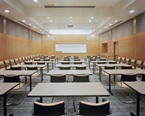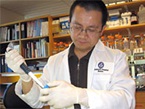Division of Emergency Medicine | Teaching Conferences
The Division of Emergency Medicine is committed to education in the specialty through a comprehensive didactic curriculum to complement bedside teaching.
Conferences for fellows and faculty in Pediatric Emergency Medicine are held Thursday mornings from 8am to 12noon. This is protected time for the fellows. Speakers regularly utilize our audience response system, small group discussions, and multi-media to engage learners. Conferences cover clinical topics, teaching and education, and research and quality improvement.
Clinical Conferences
The clinical conferences commonly focus on case management, procedural training, evidence-based medicine, ordering and interpreting radiologic imaging, literature reviews, and ED quality and operations. Case management conferences are rooted in clinical experiences, but are chosen to address the core content as established by the Sub-board in Pediatric Emergency Medicine. Procedure conferences are held monthly and provide non patient-based training across a wide array of procedures. Acuity conference is a favorite. It highlights critical care cases from each month, focusing on acute clinical management and decision making for our most acute patients. Morbidity and mortality conference reviews are held monthly. Imaging conferences are often multidisciplinary with radiology/neuroradiology, and complemented by regularly scheduled lectures/sessions on emergency bedside ultrasound imaging, provided by our ED Division of Ultrasound.

Teaching Conferences
Teaching and education conferences consist of a series of lectures and interactive sessions that focus on teaching skills, pedagogy, adult learning theory, and presentation techniques. Fellows also receive structured feedback from program directors and survey responses from those in attendance at the conference.
Research and Quality Improvement Training
In addition to the inclusion of discussions related to statistics and research in our Thursday morning sessions, a longitudinal three-year curriculum has been developed to provide both didactic and hands-on training. Sessions are designed to temporally match where fellows are likely to be with regard to their own scholarly work over the three year fellowship.
Similarly, a two year rotating quality improvement and patient safety curriculum incorporate key topics and methodologies in quality improvement science. A fellowship group-based QI project is created under the guidance of designated QI/PS faculty. Each project is conceived and implemented by fellows. Our fellows have been successful at presenting their work at both local and national meetings.
Life Support Training
Finally, all faculty and fellows complete courses which are integral to the specialty of pediatric emergency medicine. These include Advanced Cardiac Life Support (ACLS), Advanced Trauma Life Support (ATLS), Advanced Pediatric Life Support (APLS) and Pediatric Advanced Life Support (PALS). Fellows may opt to become PALS instructors if they wish.

Resident and Medical Student Conference (Friday Mornings)
Additional conferences are currently held on Friday mornings from 9am-12 pm for rotating residents and medical students as well as visiting residents in Emergency Medicine and Pediatrics. These lectures are typically given by a PEM fellow or a PEM attending. These conferences cover a structured curriculum in pediatric emergency medicine and serve as a teaching requirement for the fellows. The final hour each Friday is devoted to simulation-based instruction providing in-situ experiences with high fidelity simulators.

